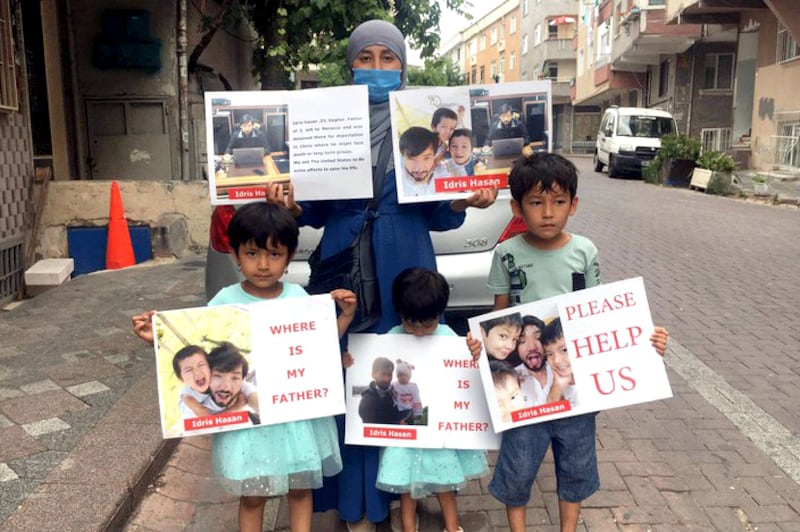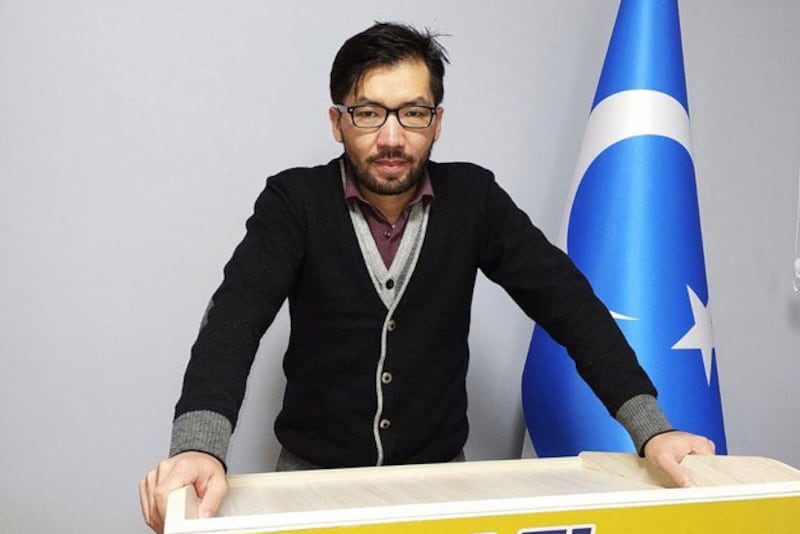Read RFA coverage of this report in Uyghur.
A Uyghur human rights activist detained in Morocco for 43 months and sought by China for extradition on “terrorism” charges was freed last week and resettled in the United States.
Idris Hasan, 36, had been held in the North African nation since July 2021. The Chinese government accused him of being a member of the terrorist group East Turkestan Islamic Movement and participating in activities within terrorist organizations while he lived in Turkey.
The U.S., British and Canadian embassies in Rabat played a critical role in getting Hasan freed by applying international pressure, said Abduweli Ayup, founder of the Norway-based Uyghuryar Foundation, who worked to get Hasan released.
The day before his arrival in the U.S., Hasan was taken to the U.N. office in Morocco, and was accepted by the U.S. for settlement.
“I am deeply grateful to the individuals and organizations who helped me throughout this journey, especially the U.S. government,” Hasan told Radio Free Asia after he arrived in Washington on Feb. 14.

Omer Kanat, executive director of the Uyghur Human Rights Project, met Hasan at the airport to help him settle in the U.S.
Long ordeal
Hasan previously worked as a translator in Turkey, documenting crimes against Uyghurs in Xinjiang in northwestern China.
His ordeal began when he was arrested at Casablanca’s airport on July 19, 2021, after he flew to Morocco to seek asylum. Authorities took him to a prison near the town of Tiflet after Interpol issued a red notice to member countries seeking his capture.
But after extensive media reports on his case, Interpol suspended its warrant in August 2021, citing its bylaws forbidding persecution on political, religious or ethnic grounds. However, in December of that year, a Moroccan court approved an extradition request by China.
Following Hasan’s arrest, his wife, Buzeynur Obul, contacted Ayup of the Uyghuryar Foundation, whom Hasan knew when both men lived in Turkey. The organization, also known as Uyghur Hjelp, documents Uyghurs who have been arrested and imprisoned.
RELATED STORIES
US urged to help Uyghurs in deportation peril in Morocco, Saudi Arabia
Moroccan court rules in China’s favor to extradite Uyghur accused of ‘terrorism’
Interpol elects Chinese cop in charge of pursuing overseas fugitives to senior role
Ayup served as coordinator and translator and sought financial support for Hasan and his family from various organizations and individuals. He worked to have Interpol cancel its warrant for Hasan and sought help from the U.N. Committee Against Torture.
He also sought assistance from Safeguard Defenders, a nonprofit organization that monitors disappearances in China, particularly those of human rights activists whose lives are in danger.
‘Quiet diplomacy’
Laura Harth, the group’s campaign director and lead on transnational repression, suggested hiring a lawyer, through whom Ayup and others sent Hasan books, clothes and money.
In February 2022, the heads of the U.S. Congressional-Executive Commission on China sent a letter to Secretary of State Antony Blinken identifying Hasan and other Uyghurs being held in Morocco and Saudi Arabia, who were in danger of being sent back to China.
“They are at serious risk of arbitrary detention, torture, and other forms of severe mistreatment if they are returned to China, particularly in light of the ongoing genocide and crimes against humanity taking place in the Xinjiang Uyghur Autonomous Region,” the letter said.

Moroccan authorities were set to release Hasan on two previous occasions, though the third, successful attempt occurred in secret, Ayup said.
“Quiet diplomacy proved to be effective, and no news was shared until he had left Morocco,” he told RFA.
Those advocating for Hasan’s release said he should not be sent back to China, fearing he would be tortured and killed, Obal told RFA.
“We spent 43 months living in fear and anxiety while he was imprisoned,” she said. “Now that he’s in a free country, I feel relieved. My fear has lifted, and I’m happy.”
Obal said she and her three children were grateful for the financial support they received while her husband was being detained, though they live in difficult conditions as refugees in Turkey. They want to be reunited with Hasan, but they don’t have passports from any country.
Translated by RFA Uyghur. Edited by Roseanne Gerin and Malcolm Foster.
